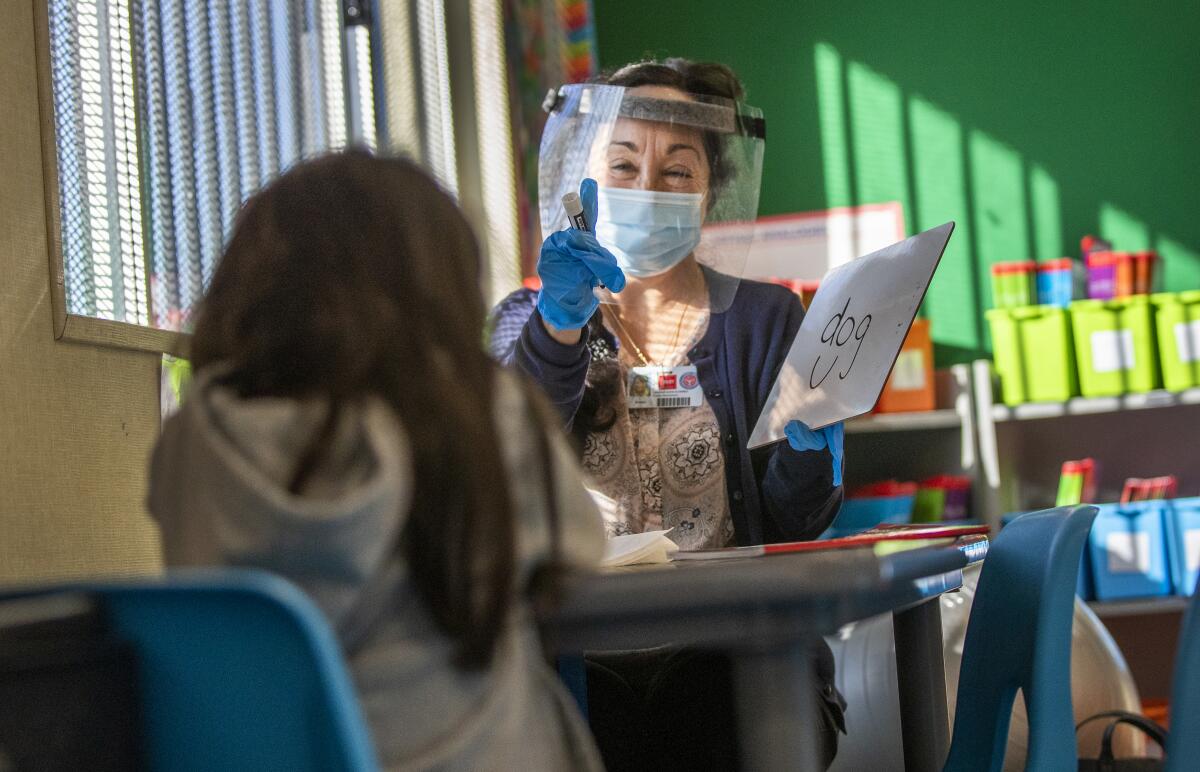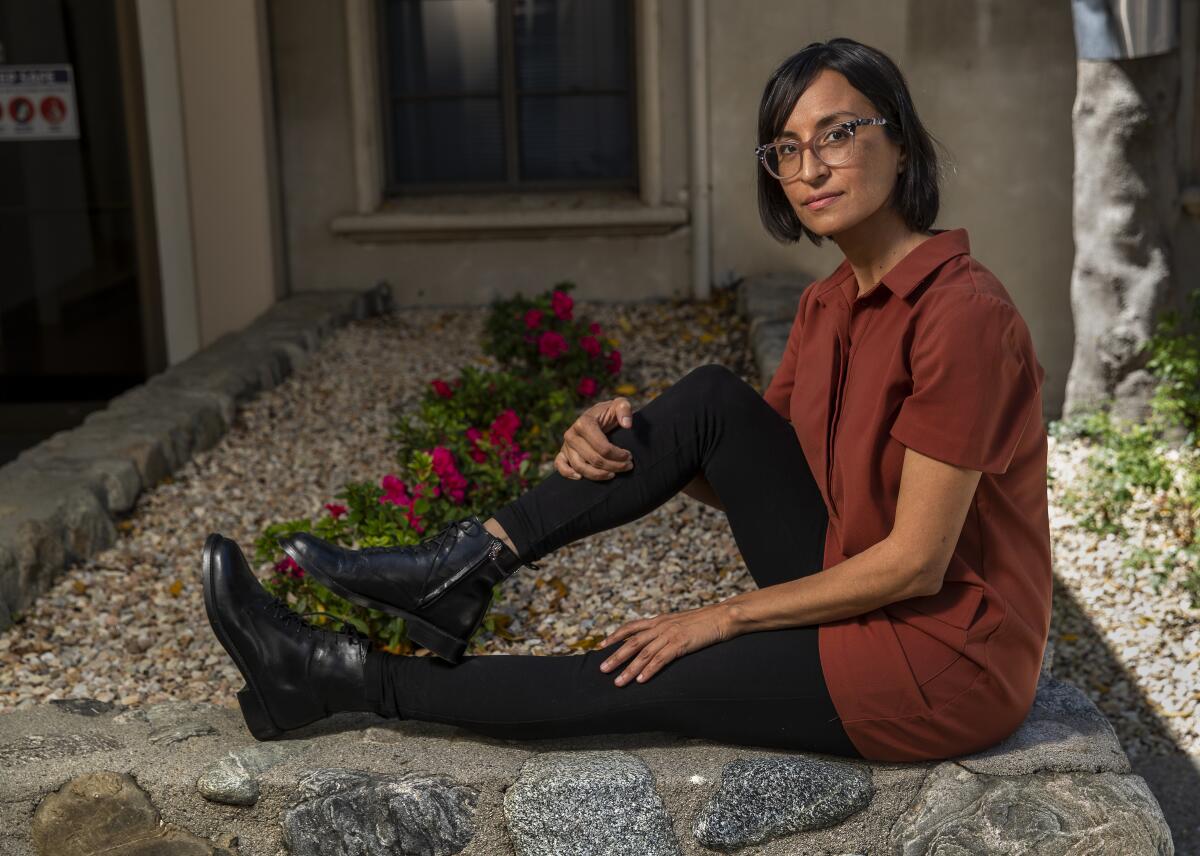Latinx Files: ‘An educational pandemic’ for English learners in California schools

- Share via
At the risk of being repetitive, the COVID-19 pandemic has been disproportionately devastating for the Latinx community in Los Angeles and across the country.
The latest confirmation of this tragic truism can be found in my colleague Paloma Esquivel’s report on how the progress of English learners in California’s schools has been endangered by the pandemic shutdown.
“It’s an educational pandemic,” Martha Hernandez, the director of a nonprofit that advocates for English learners, told The Times. “We already had issues of an achievement gap, opportunity gaps, lack of access, lack of equity. Now that’s just exacerbated, and it will be a huge challenge. It will have a big impact for many, many years.”
California has more than 1.1 million students classified as English learners. Nearly 80% of them are Spanish speakers. As Esquivel notes, these students have faced educational challenges long before the start of the pandemic. In 1998, California voters approved Proposition 227, which ended bilingual education in the state. It was a disaster — voters repealed those rules in 2016 by passing Proposition 58.
The Latinx experience chronicled
Get the Latinx Files newsletter for stories that capture the multitudes within our communities.
You may occasionally receive promotional content from the Los Angeles Times.
Then came the pandemic, which brought with it the additional challenges of distance learning and isolation.
“Our kids were already behind,” said Francisco Lozano, a parent organizer and father of an English learner in the fifth grade. “But now? If the districts and the schools don’t start doing what they need to do, we’ll all be left behind.”
That fear is understandable. As we near the end of the shutdown — California is slated to reopen fully by June 15 — many people will find themselves in a worse position coming out of it than how they went into it. The pandemic has repeatedly exposed the inequities in our society. Only time will tell if we fix them or if we’ll let these bigger inequity gaps become the new normal.
Want more of The Times’ education reporting delivered to your inbox every Monday? Sign up for 8 to 3, a weekly newsletter written by staff writer Sonja Sharp.
Consider subscribing to the Los Angeles Times
Your support helps us deliver the news that matters most. Become a subscriber.
Meet our Latinx staff: Paloma Esquivel
The Los Angeles Times employs more than 100 Latinx journalists. One of the goals of this newsletter is for you to meet them all. This week, we highlight Paloma Esquivel, education reporter and co-founder and co-chair of the Los Angeles Times Latino Caucus. In her own words, Esquivel tells us about the importance of covering underserved communities.
I’ve been at the Los Angeles Times for 13 years now. In that time, I’ve traveled all over Southern California telling stories about about many things, from mass shootings to police trials to a murder charge against a rehab center.
For several years, I covered the Inland Empire, which is where I’m from. As a reporter, it’s always been important to me to keep an eye on communities outside of L.A. that don’t always get the attention they should.
Last year, I got the chance to cover education, which I’ve always wanted to do because of the crucial role schools play in our lives.
I started in March 2020, just as schools were shutting down. Since then, with our education team, I’ve focused on how the pandemic is exacerbating long-existing inequities for students.
We published a survey showing how online learning cheats poor students. We showed how schools in more affluent areas were reopening faster than ones in low-income communities. And this week, I wrote about the devastating impact of the pandemic on English learners.
I see this focus on inequity as crucial. We live in a state where the vast majority of K-12 students in public school are students of color and a majority are from low-income families. In Los Angeles Unified, almost 75% of students are Latino and about 80% are from low-income families.
We can’t tell the story of education in California without zeroing in on the inequities that continue to exist in our educational systems.
Things we read this week we think you should read
— This baseball season marks the 40th anniversary of Fernandomania. Times columnist Gustavo Arellano wrote about why Fernando Valenzuela, a pudgy pitcher from Etchohuaquila, Sonora, is still seen as a Mexican American icon four decades later.
The Times is also releasing a multipart documentary series examining the legacy of “El Toro.” Print and digital subscribers are invited to the screening of the premiere episode, which will take place tonight at 6. After the screening, Arellano will join deputy sports editor Iliana Limón Romero and Mexican American baseball historian Dr. Richard Santillán for a Q&A with the audience. If you’re a paying subscriber, you can register for the event here.
— The Los Angeles Times Festival of Books kicks off on Saturday. It’s free, so you should sign up for all the panels — but if I had to make one recommendation, it would be this panel on the art of the short story, which will feature author and El Monte native Carribean Fragoza, who has a new collection of short stories out and was just profiled for The Times by Dorany Pineda.

— A taco is never just a taco. In the case of Los Angeles chef Ricardo Diaz, the carnitas taco from his new taqueria in Whittier contains a family history and journey that began with his grandfather honing the recipe while working as a bracero in Montana and Idaho. You can read more at L.A. Taco.
— My condolences to El Pasoans, who on Monday lost some significant bragging rights after Baylor defeated Gonzaga for the NCAA men’s basketball national title. Baylor’s win makes them the second Texas team to win the title. The first was the 1966 Texas Western squad, which won it with an all-Black starting lineup (also a historic first). For Texas Monthly, the homie Roberto José Andrade Franco explains why the now broken 55-year streak is so important to the predominantly Mexican American border city.
— And speaking of colleges from predominantly Mexican American border cities winning titles, felicidades to the University of Texas-Rio Grande Valley for winning their third consecutive President’s Cup Chess Championship, the chess version of the Final Four. Believe it or not, Brownsville, Texas, has become a chess hub because of UTRGV.
— ICYMI: Times music writer Suzy Exposito profiled reggaeton artist Karol G last week, who’s making waves in a genre dominated almost exclusively by men. Karol G also addresses her since-deleted tweet in which she tried to show support for the Black Lives Matter movement by posting a photo of her black and white dog as an example of racial unity.
The best thing on the Latinternet: TBT to the epic showdown between punks and emo kids in Mexico City
Shout out to the internet’s collective memory, which recently reminded me that this truly bonkers news segment actually aired on Mexican television.
It’s entirely in Spanish, so apologies to our readers who don’t know the language — but all you have to know is this: In 2008, a street fight broke out between those in the punk scene and the emo scene in Mexico. The beef was that punk kids thought the emo kids were copping their style and essentially started beating them up. This feud culminated in a showdown at the Glorieta de Insurgentes in Mexico City. Tired of being bullied, hundreds of emo kids gathered at this spot to fight back. What happened next is a prime example of why Latin America is the inventor of magical realism.
If you’d like to know more about the punk/emo wars of 2008, these Noisey and NPR reports give great context and delve into the issues of class and homophobia that contributed to this violence.
The Latinx experience chronicled
Get the Latinx Files newsletter for stories that capture the multitudes within our communities.
You may occasionally receive promotional content from the Los Angeles Times.







